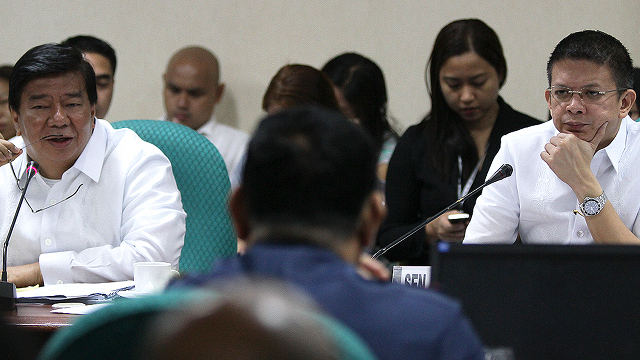SUMMARY
This is AI generated summarization, which may have errors. For context, always refer to the full article.

MANILA, Philippines – Instead of sitting behind their desk, policemen should be on the streets to fight crime, senators say.
“Every time you face us here, this is always an issue: police visibility. Year in and year out, I don’t see any improvement or conscious effort on your part to improve police visibility,” Senate President Franklin Drilon told police chief Alan Purisima.
In the budget hearing of the Department of the Interior and Local Government (DILG) on Monday, September 2, senators asked Purisima and Interior Secretary Manuel “Mar” Roxas II how they are making use of the Philippine National Police (PNP) budget for personnel.
The Department is asking for a budget of P99.595 billion in 2014, up from P91.164 billion this year. The bulk of the amount or 76% goes to personal services amounting to P75.25 billion.
Drilon pointed out that the law required a ratio of one policeman for every 500 Filipinos. Yet Purisima said that in practice, the ratio is 1:645, with the gap increasing to 1:1,000 in some parts of Metro Manila.
Purisima and Roxas said that besides hiring new policemen, the PNP also has to hire replacements for personnel who retired or were dismissed from service.
Roxas said even President Benigno Aquino III saw the need to improve police visibility, approving a recruitment plan 3 months ago.
“He approved the recruitment of 15,000 civilians to take the place of 15,000 uniformed, trained policemen presently doing desk or administrative jobs. So these 15,000 can be put out into the field,” Roxas said.
Purisima said there are a total of 145,501 policemen in the Philippines, with only 115,000 working in the field while the rest do investigative or administrative work.
Senators expressed concern about the incidents of crime in Metro Manila, citing shooting incidents, snatching and theft often perpetuated by so-called “riding-in-tandem” or a pair of suspects on board motorcycles.
No aircraft for PNP
Besides the lack of manpower, Purisima also revealed that the PNP does not have a single operational aircraft.
He said the last one crash-landed in Kalinga last month, another exceeded its flying time, while two cannot be used because they are being investigated in relation to the allegedly anomalous purchase of second-hand choppers in 2009 and 2010 linked to former presidential spouse Jose Miguel “Mike” Arroyo.
Drilon suggested that the PNP ask the Office of the Ombudsman to allow the agency to use the two choppers.
“It is just the lack of effort. If you make representations with the Ombudsman and the Ombudsman makes representation with the court, I am certain the use of this will be permitted. What is important is the identification of the aircraft, serial number. If it has good record, I think the court will allow the use of this,” he said.
Roxas though read a document from the Ombudsman denying the request of the PNP to use the helicopters.
In case the Ombudsman will allow the use of the choppers, Roxas said the agency will need P40 million for the repair of each chopper.
Uniform emergency hotline
The security officials also discussed the proposal to change the country’s emergency hotline from 117 to 911.
“Nationally, we use 117 but in Davao it is 911. If you are a tourist, it is difficult to remember what’s the emergency number to call. For the tourists, 911 is the default number,” Roxas said.
Roxas said the 117 hotline is functioning in only 6 out of the 15 regions in the Philippines.
“The 117 Operation Center, it’s not an effective tool at present. More than 95% of the calls are directory assistance, prank and other types. That is why there’s an ongoing process at the Napolcom (National Police Commission) to reconfigure this program so it can be more effective.”
Roxas also discussed the other programs meant to improve the work and image of the police, which was named the country’s most corrupt institution in the Global Corruption Barometer of Transparency International:
- Operation Hilamos – The President allocated about P100,000 per police station for repairs like painting walls, fixing bathrooms and leaking roofs. Roxas said the plan aims to promote “respectability” of the PNP. It is also called “Oplan Dignity.”
- Oplan Katok – Police go to the houses of gun owners whose firearm licenses have already expired. Cops ask them to fix their registration papers.
Pension problem ‘untenable’
Roxas admitted that another problem the PNP faces involves pension, similar to the issue the Armed Forces of the Philippines is confronted with.
“Eventually the entire personal services will be overtaken by pension rather than salaries for ongoing personnel. In fact, for 2014, there is in addition to the P75 billion for PNP, there is P22 billion set aside for pensions of all retired PNP,” he said.
Roxas though said that efforts to reintegrate the uniformed personnel to the Government Service Insurance System (GSIS) will have to be studied because this will require legislative action.
He added that there are other considerations like the PNP personnel having a lower retirement age compared to regular government officials. The mandatory retirement age for police officials is 56.
“The present situation is untenable and eventually we won’t have enough money to fund this. Whatever the solution will be, we are open,” Roxas said. – Rappler.com
Add a comment
How does this make you feel?
There are no comments yet. Add your comment to start the conversation.